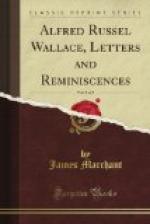men have sympathetically entered into bordering
territories and therein excelled. The whole field
of psychical research was familiar to him, and he might
have been a leader in it.
My last meeting with him was at his final home, the “Old Orchard,” Broadstone, in 1909. I was staying at Boscombe in Hants, and he asked me to “come and see his garden, while we talked of past days.” He had then the freshness of boyhood, blent with the mellow wisdom of age.—W.A.K.
The eminent naturalist and traveller, Dr. Henry O. Forbes, who later explored the greater part of the lands visited by Wallace, contributes the following appreciation of the latter’s scientific work:
As a traveller, explorer and working naturalist, Wallace will always stand in the first rank, compared even with the most modern explorers. It ought not to be forgotten, however, how great were the difficulties, the dangers and the cost of travel fifty years ago, compared with the facilities now enjoyed by his successors, who can command steam and motor transport to wellnigh any spot on the coasts of the globe, and who have to their hand concentrated and preserved foods, a surer knowledge of the causes of tropical diseases, and outfits of non-perishable medicines sufficient for many years within the space of a few cubic inches. Commissariat and health are the keys to all exploration in uncivilised regions. Wallace accomplished his work on the shortest of commons and lay weeks at a time sick through inability to replenish his medical stores.
He was no mere “trudger” over new lands. Where those before him, and even many after him, have been able to see only sterile objects, his discerning eyes perceived everywhere a meaning in the varying modes of organic life, and in response to his sympathetic mind Nature revealed to him more of her multitudinous secrets than to most others. Wallace’s Amazonian travels were far from unfruitful, in spite of the irreparable loss he sustained in the burning of his notes and the bulk of his collections in the vessel by which he was returning home; but it was in the Malay Archipelago that his most celebrated years of investigation were passed, which marked him as one of the greatest naturalists of our time. As a methodical natural history collector—which is “the best sport in the world” according to Darwin—he has never been surpassed; and few naturalists, if any, have ever brought together more enormous collections than he. The mere statement, taken from his “Malay Archipelago,” of the number of his captures in the Archipelago in six years of actual collecting, exceeding 125,000 specimens—a number greater than the entire contents of many large museums—still causes amazement. The value of a collection, however, depends on the full and accurate information attached to each specimen, and from this point of view only a few collections, including Darwin’s and Bates’s, have possessed the great scientific




